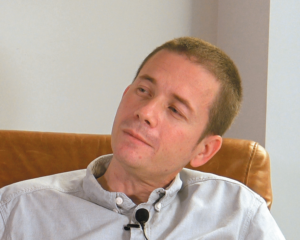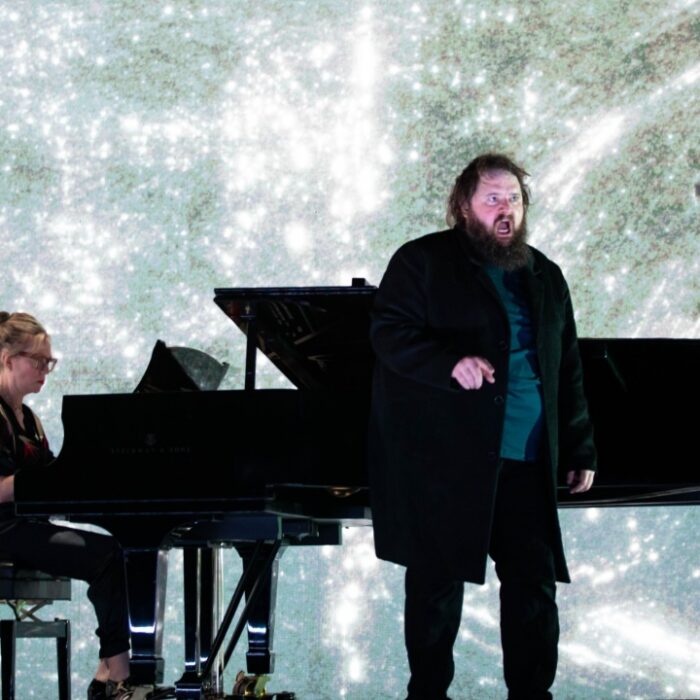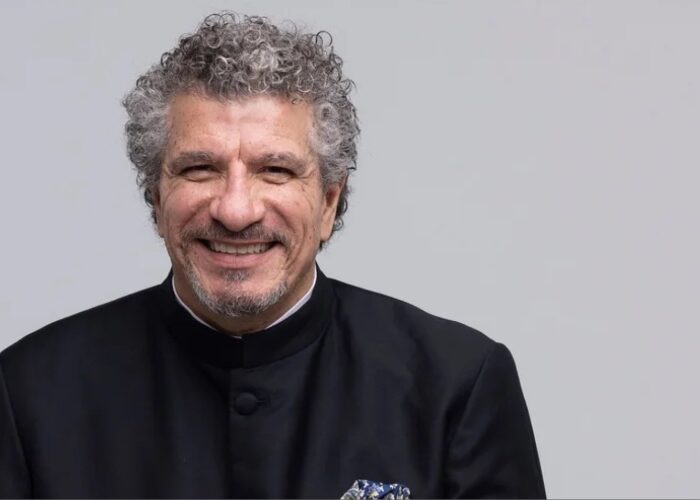
A Heroic Tenor’s Journey – How Zoran Todorovich Continually Reshaped His Vocal Technique To Conquer Some of Opera’s Most Challenging Roles
By Dejan Vukosavljevic(Provided by Zoran Todorovich )
“I was very happy to have wonderful parents and to grow up in a family full of love,” he told OperaWire in a recent interview. “Growing up for me was mostly without music though. Nobody in my family had any musical background. But I really had a huge freedom to choose what I wanted to do. I loved to go to the school, I loved to study.”
And he also loved the arts.
“I had strong wish to paint, to engage in musical sections. We had lot of sections in our school at the time – literature, painting, music. It was very well organized and I wanted all of that. I couldn’t explain it to myself,” he noted. He also learned to play the guitar during his youth and even started a band for Latin American music.
“We organized concerts, even playing on the street. It was beautiful,” Todorovich explained.
However, as the tenor admitted, his career was not initially destined to be in the world of arts. Instead, his initial career path seemed headed toward electrical engineering.
Then a romance sealed his fate.
The Tenor’s Fate
Todorovich met a girl and fell in love. He wanted to be close to her and decided to audition for a chorus that she was a part of that traveled across Europe. It was at this juncture that he met the chorus’ conductor, who was also the director of the music school “Vasilije Mokranjac.”
“He was the first person who heard something more in my voice. Then he asked me if I ever thought to make singing my profession. I was surprised,” the tenor continued. “After that, things really accelerated. I was introduced to Professor Mirjana Vlahović, who took me in her class, as her student. That was the beginning.”
Those years were a bit harsh for the young Todorovich, as he was engaged in two very different career paths – electrical engineering at the University of Belgrade and his musical classes.
“I had a lot to do, and learn all of the things my classmates in the musical school learned before me,” he noted. “I really invested everything in this music school. I continued with the electrical engineering studies, mostly out of pure duty, to finish what I had started.
“But I already knew it wouldn’t be my future.”
At that moment Todorovich felt he was a bit old for a music school, but his love for music was so strong, that it engulfed him completely. After three years in the Music school “Vasilije Mokranjac,” another fateful moment took place.
He sent some recorded tapes to his aunt in Frankfurt, Germany.
“She asked my mother if she realized how talented I was. Oh yes, my mother responded – everybody loved him singing!” added tenor with a laugh.
From there things really accelerated, as Todorovich’s relatives undertook serious efforts to bring the young singer to Germany. Leaving Belgrade was not easy for him – he was scared and thrilled at the same time. The only thing that comforted the young tenor was the fact that he would be living with his family, in their house.
He then enrolled in Hochschule für Musik und Darstellende Kunst in Frankfurt where there 130 students audition for 11 spots in the school.
He sang arias from “Werther,” “Rigoletto” and “Carmen.”
“It was a harsh competition. I was not prepared, I did not know the language. But what I learned in the Music school in Belgrade proved unbelievably useful, so I made it. I was one of 11 chosen.”
One professor, particular, was so taken aback by Todorovich’s audience that he requested that the tenor go directly into his class.
“That was all hugely surprising for me. I did not expect anything from that week. I got everything that I wanted.”
For some, this crossing of the threshold would represent a major turning point for any career with the only way to go upwards. But it wasn’t that simple for the tenor. The four years at the Hochschule für Musik und Darstellende Kunst didn’t leave him satisfied – his vocal technique was not suitable.
“I was not making progress. This all did not suit my voice well, I closed my vowels, I shut down my technique.,” he explained. “I was not successful at all. The color was there, but I was not really developing. I was feeling tired after two arias, so I was wondering how I could sing at all.”
He split up with his professor.
Returning With An Elixir
But his disappointment didn’t last long.
While Todorovich’s technique didn’t have many admirers, there was an agent that loved his voice. And he found him a good teacher that was able to help the young tenor.
Now Todorovich found himself in Munich, in another school, with special courses organized for him. And it was here that he found a new teacher that helped the young singer open his throat so that he could make beautiful music again.
And like every good hero’s journey, he had to make a return to where it all started with this new elixir – Frankfurt.
“As all of my colleagues were there for the final concert exam, they all looked sympathetic. They felt sad because my voice did not work well anymore,” he noted. “And then I sang. One of my colleagues ran outside to call all the others, screaming: ‘Come here quickly! Zoran came back with a new voice!’
“The right person at the right moment was there for me. And at that moment I knew I would become a professional opera singer. That was the moment of revelation. It felt a bit scary at the same time, emotionally.”
After very short time Todorovich got his first contract with the Landestheater Detmold, in a very lovely and quiet city. The tenor fell in love with it immediately.
“That was the best decision that I ever had,” Todorovich added. “I couldn’t have been happier. And there would also lie a first piece of advice for the young singers: don’t always shoot for big opera houses. Yes, I was in a small theater of Detmold, but a Pavarotti from Detmold. And from there I was able to go on.”
That’s when it all truly came to fruition for the tenor.
While there, a representative from the Staatsoper Hannover heard the tenor. They asked him to sing with the company. At the same time, a concert agency from Vienna asked for a young singer. There he got an appointment with a big agency, which was followed shortly after by an invitation to sing “Madama Butterfly” at the Vienna State Opera.
“I was not that prepared for the role,” tenor recalled. “I thought it would be something else, like ‘Rigoletto’ or ‘Lucia di Lammermoor.’ But again, I had sung it in Detmold, so it made things easier. I was really full of energy and hope that things would eventually be fine. But I was surrounded by the best singers of that time.”
That performance was revealing for the young singer. “Pinkerton is such a mix of everything. He has to be young, but with a powerful voice in order to survive the huge orchestration. He also has to be very charming and charismatic. Even in the dressing room I knew I would be a very good-looking Pinkerton. It was a huge success.”
The success of that first performance was so big that by intermission, the agent entered his dressing room with a piece of paper with the words “‘La Juive,’ Prince Léopold” written on it.
“They liked the first part so much, that I was offered the new role during the intermission,” Todorovich stated with a big smile.
But then came the biggest change of his life. The tenor, who had begun his career singing roles like the Duca di Mantua or Mario Cavaradossi, realized that his voice had much more to offer.
“I guess I was never satisfied with the state of things as they were,” he added seriously. He somehow realized that the next obstacle was waiting for him and started to look for solutions. “It was not easy. After so much experience, singing for 10 years in biggest opera houses, I felt that something big was ahead of me.”
But he felt he wasn’t ready for that next big task – his technique still needed some major work.
“I did not like some things in my technique. I was faking some notes.”

(Credit: Niedersächsische Staatsoper Hannover)
A Whole New World
When Todorovich went to Lugano for a masterclass with the famous singer Bruno Pola, he confirmed what he had feared for some time – his technique was not that good.
“I was, at that point, suffering instead of enjoying,” the tenor recalled. “It was not pleasant at all.”
Pola, it turns out, would be exactly the antidote to this issue, reshaping Todorovich’s vocal technique, enabling him to move into more dramatic repertory.
Everything moved quickly from there with the tenor suddenly engaged for such roles as Turridu in “Cavalleria Rusticana,” Canio in “Pagliacci,” Don Alvaro in “La Forza Del Destino,” and Dick Johnson in “La Fanciulla Del West.”
But the true turning point would be Pollione in “Norma.” This would be the role that secured the tenor of his big move.
“Pollione was that first really dramatic role that I longed for,” Todorovich explained. “I was really not a flexible lyric tenor anymore. In every way, by every classification I was always a lyric spinto tenor, but my technique was limited. And then I realized how much I was able to do with a proper technique. I never changed my voice, I just gave it more possibilities to open.”
His first performance as Pollione was with a Munich Philharmonic, followed by a fully staged version at the Bayerische Staatsoper. His soprano on that production? The legendary Edita Gruberova. Todorovich recounted how the famed soprano turned into a major ally from the very first moment they started to work together.
“You know, the opera opens with the Pollione’s aria. I started singing and she jumped out of her seat, came to me and started to touch my abdominal muscles. She was shocked of where the voice came from,” he noted. “The next day, she came to me and asked if I could explain what I had done to develop my voice so much in such a short period of time. And the most amazing thing about Edita Gruberová was that she had such a fantastic control of voice. She also had immensely professional approach, coming at least 10 minutes before anyone else to the rehearsal. She was also very supportive for younger colleagues like myself. Always with a smile, always so friendly.”
Another major ally for Todorovich when he started to take on this big transition was Dutch spinto soprano Eva-Maria Westbroek with whom he appeared in such operas as “La Fanciulla del West” and “La Forza del Destino.”
“Eva is not just a partner, she is a sister,” the tenor added warmly. “I have never met such a great singer and such a warm, normal person at the same time. On the stage, off the stage, she was just herself. She has never changed. She has never played diva, she has always been a natural human being. And she has always worked hard to achieve great artistry.
Another big name that seemed to brighten Todorovich’s smile all the more was Nina Stemme.
“There is something I bet you were not able to find,” he said with a friendly grin on his face. “Papano’s era of a Brussels opera, and the following cast of Tchaikovsky’s opera ‘Eugen Onegin:’ Peter Mattei as Onegin, Nina Stemme as Tatyana and myself in the role of poet Lensky. After some years, I met Nina in an elevator in Tokyo and screamed: ‘Tatyana!'”
Over time, Todorovich’s repertory expanded and he became a major proponent of several roles, with Verdi’s Otello arguably his most recognized.
The tenor has sung Otello several times, with his most recent run taking place at the Opernhaus Zürich alongside Maria Agresta as Desdemona and Serbian baritone Željko Lučić as Iago.
“Otello is sinking into the madness of jealousy. Depending on the production, several difficulties may arise,” Todorovich said of the character. “Sometimes it is easier, sometimes more difficult to credibly portray that pathetic jealousy on stage. Jealousy is something that grows up in a person. For example, I do not want to immediately show that jealousy, but to grow it over time.
“Initially I am showing only Otello’s insecurity that turns into something much more drastic. Otello is simply an outcast, he feels it, fights for the position, and then loses his mind. He just sees lots of enemies, no friends. My own personal touch to the role was to show that initial insecurity, and then build the character dramatically on it.”
A Wagnerian Tenor
When it comes to the dramatic repertory, the name Wagner is undeniably a major threshold that many tenors flirt with, but few truly walk through.
In 2009 Todorovich debuted in the title role of the Wagner’s “Lohengrin” at the Teatro Massimo di Palermo.
“Before Palermo, one important thing happened. I sang in ‘Il Trittico’ in Berlin, and there I met Katharina Wagner, because that was her production,” he explained. “After the premiere she came to my dressing room and said: ‘There is a present for such a great performance. I want to invite you to audition in Bayreuth. We are searching for Lohengrin.'”
Todorovich went to Bayreuth for the audition, but he felt it was too early to sing “Lohengrin” at the hallowed hall and instead wanted to sing the role at another theater first, so he went to Palermo. Teatro Massimo di Palermo offered him a big new production and a lot of time to prepare, so he accepted. It was a major success.
But even then, Todorovich took his time with the music of the great German master. He would wait another nine years before returning to the role, this time with the Opera Vlaanderen in 2018. He performed alongside Iréne Theorin in the role of Ortrud.
“I was sad that I did not continue doing Lohengrin much more often, but I was really happy with this opportunity, especially after nine years. So many things happened during that period. My voice matured further, and I felt that I had more to offer. At that time I did not know it was a co-production with the Royal Opera House, Covent Garden. Also, the director David Alden was with us all the time, which was unusual. He worked with us to deliver a really good performance. He loved the cast, especially Iréne Theorin. It was amazing.”
Prior to his return to Lohengrin, Todorovich also took on “Parsifal” at the Flemish opera. Unfortunately, it was not quite as memorable an experience as the “Lohengrin” performances.
“I was not that lucky as I caught the flu after several performances, so I continued to sing, seven out of nine performances in total. But I lost some strength fighting the inflammation. Still, it was a production of the year,” Todorovich elaborated. “As for the character of Parsifal, it was a long process of revelations. A very complex one too.”
The Final Victory
After 25 years of a very successful career as one of the world’s leading lyrico-spinto tenors, Todorovich felt the time has come to engage more in educating young talents and helping them to fulfill their dreams. To accomplish this, he founded Opera Center “Zoran Todorovich,” located at the Theater and Opera Madlenianum in Belgrade.
“It is a very simple philosophy indeed. If you want to be a really good opera singer, you have to find a good teacher, like I found Bruno Pola in Lugano. But this is me, speaking from the point of 25 years of professional opera singing. I am a singer, not a professor of singing,” Todorovich stated. “Anyone is welcome. Anyone who wants to improve, anyone who thinks that they can become a good opera singer. Of course, I am always interested in young talents. When I hear a young talented voice, I want to call the agency for that kind of voice. Friends, conductors that I know. To ask them to help me in that moment, with a young talent.”
All he wants is for them to achieve their personal victories, which echoes his own philosophy in life.
“I sang that role [of Calaf in ‘Turandot’] at the Deutsche Oper am Rhein in 2015, and I always had my personal message. That famous ending of the aria ‘Nessun Dorma.’ Calaf sings ‘Vincerò’ and that was my message to the public, to myself, to the whole world: whatever happens, I will win. In the end I will win. And it is the most powerful statement that you can make on stage and off stage, in real life.”
It was raining in Belgrade on the day that this interview was conducted. But Zoran Todorovich never stopped singing, even during the conversation. His personal message to everyone is pretty clear. He has lived a life of song that drives away even the bad weather, or bad thoughts.
And yes, he is still winning.




